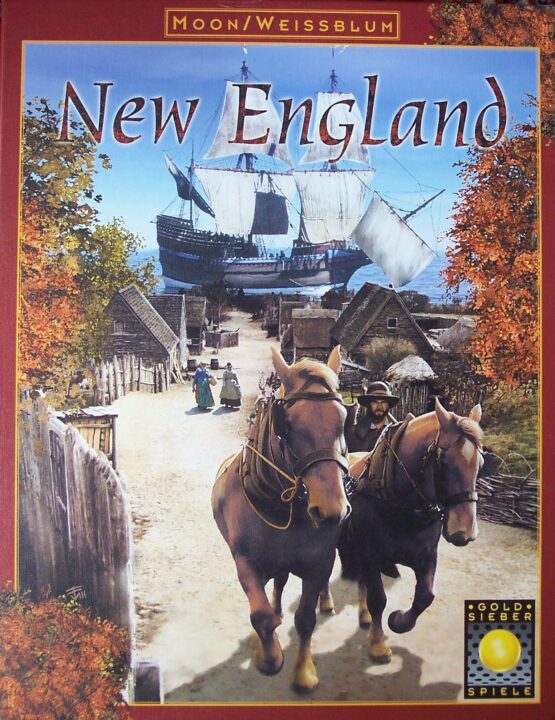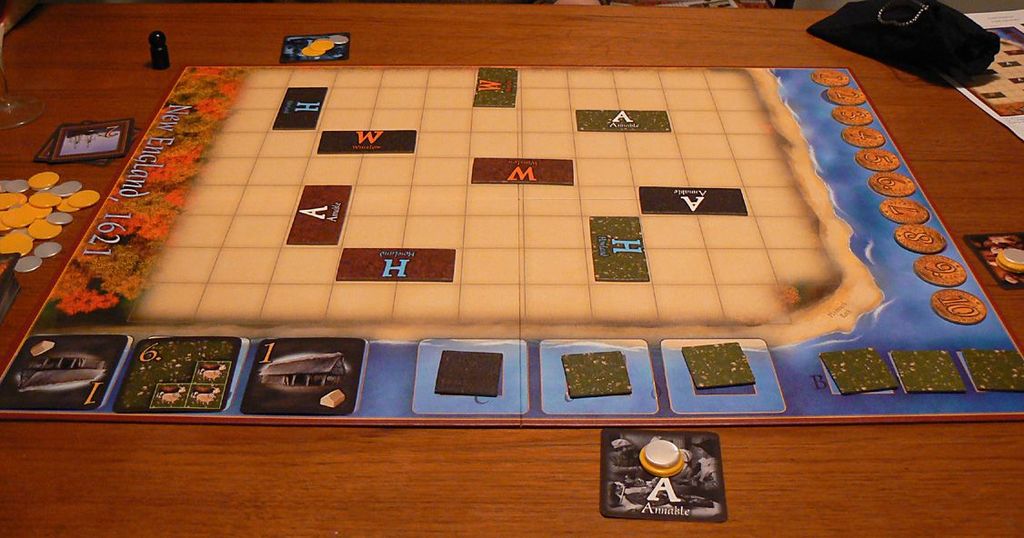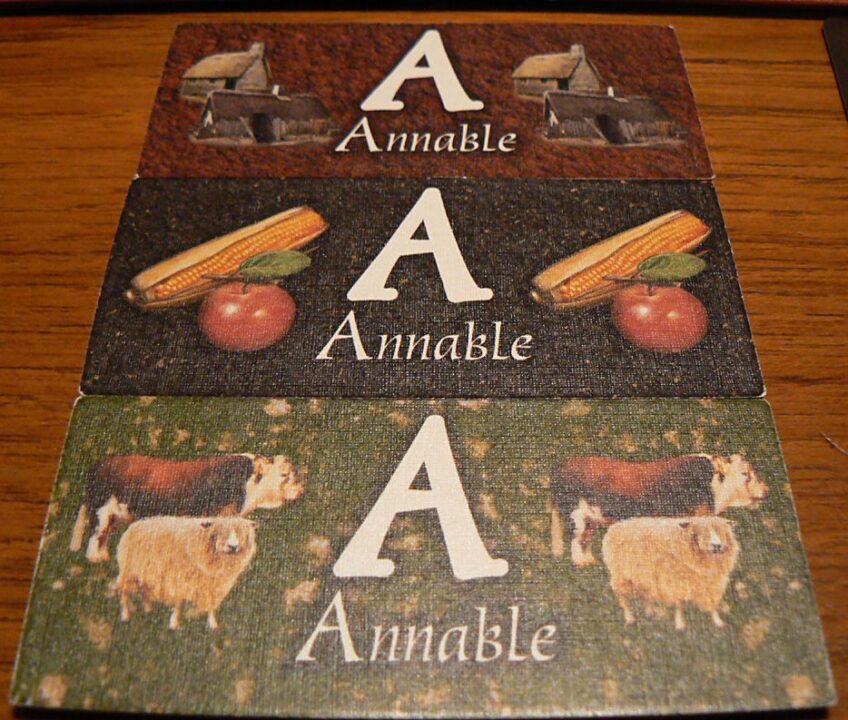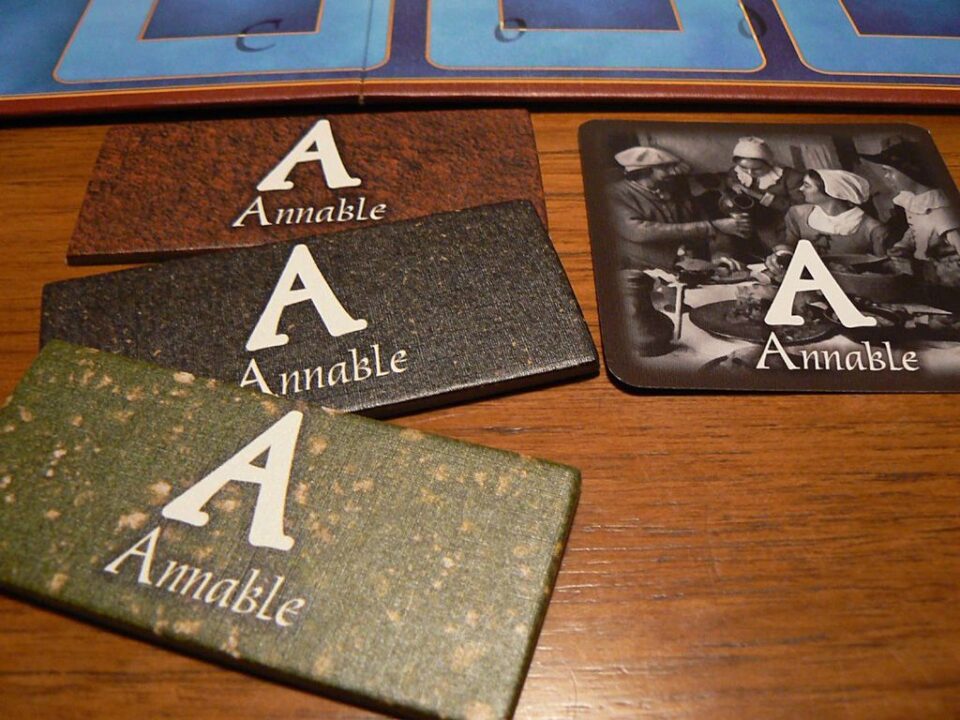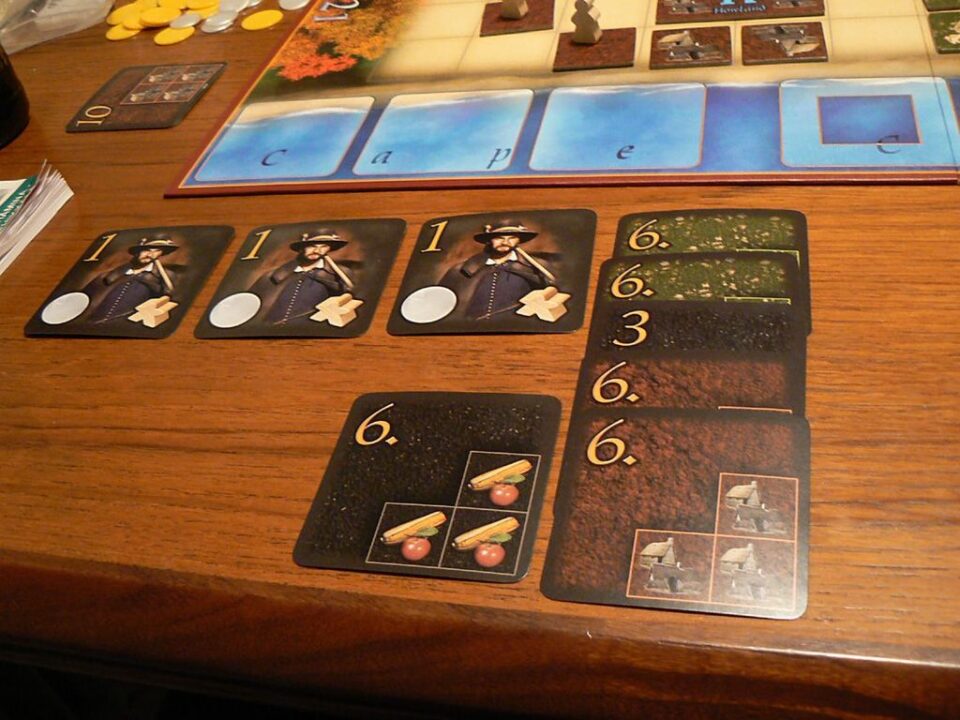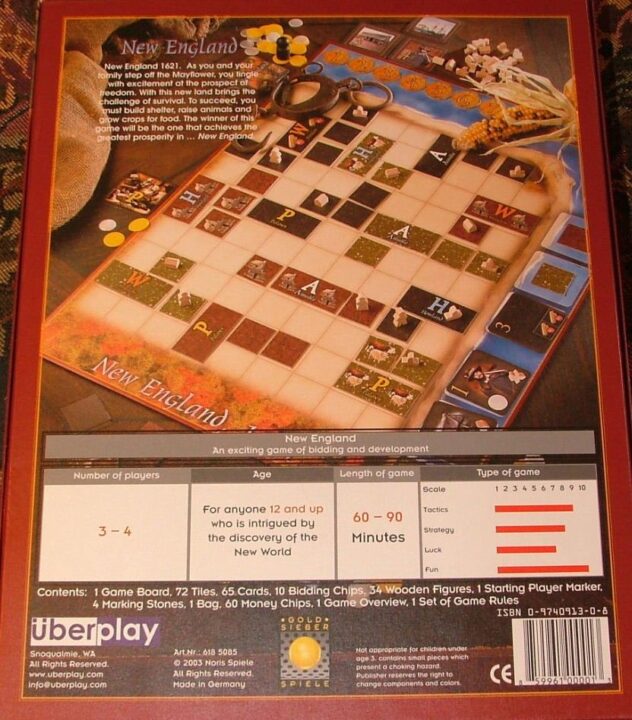Hey folks! Buckle up, because today we’re reviewing New England. We’ve got sturdy components, strategic gameplay, and a surprisingly polite tug-of-war. If you love plotting your moves, this game might be your cup of tea. But is it perfect? Well, stick around, and we’ll find out together!
How It Plays
Setting up
To set up New England, each player picks a color and grabs the matching game pieces. Place the board in the center. Shuffle the land tiles and place them face down. Distribute the initial amount of money to each player. Then, draw land tiles to start filling the grid on the board.
Gameplay
Gameplay involves players taking turns in a series of phases. First, there’s the auction phase where players bid on action cards. These cards let you claim plots of land, build structures, or gain resources. Next, players place tiles on the board to develop their land and gather points. Each player has to carefully balance their money and resources.
Winning the game
The game continues until a set number of rounds are complete or the tiles run out. Count up all the points from lands, structures, and special cards. The player with the highest score wins! But beware, luck does play a part, and sometimes the right card just isn’t in the auction.
Want to know more? Read our extensive strategy guide for New England.
Gameplay Mechanics and Balance in New England
So you want to know about the gameplay mechanics and balance in the board game ‘New England’? You’re in luck, because I’ve logged more hours playing this game than I care to admit. This game takes you back to the 17th century, where you try to establish yourself in New England. You’re managing resources, scoring points, and yes, dealing with a bit of luck here and there.
Now, let’s talk mechanics. The core gameplay revolves around auctions and tile placement. Each round starts with an auction phase where players bid for land tiles and development cards. The tricky part is spending your money wisely; overspend on land and you’ll have nothing left for development cards. Underbid, and you’ll be stuck with poor land. This makes every decision matter.
The balance is a bit of a mixed bag. On one hand, the auction system is pretty fair. Everyone gets a shot at the same resources, and good planning can outsmart even the best of us. On the other hand, the game does have its quirks. Sometimes, you’ll feel that luck plays too big a role. For example, when the available tiles don’t suit your strategy, it can feel quite unfair.
But don’t get me wrong! The game is mostly balanced and the strategic depth is stunning. Just don’t expect it to be 100% fair all the time. You’ll need both brains and a bit of luck to come out on top.
Stay tuned, because next we’ll look at how player interaction and strategy come into play. Gather your wits, you’ll need them!
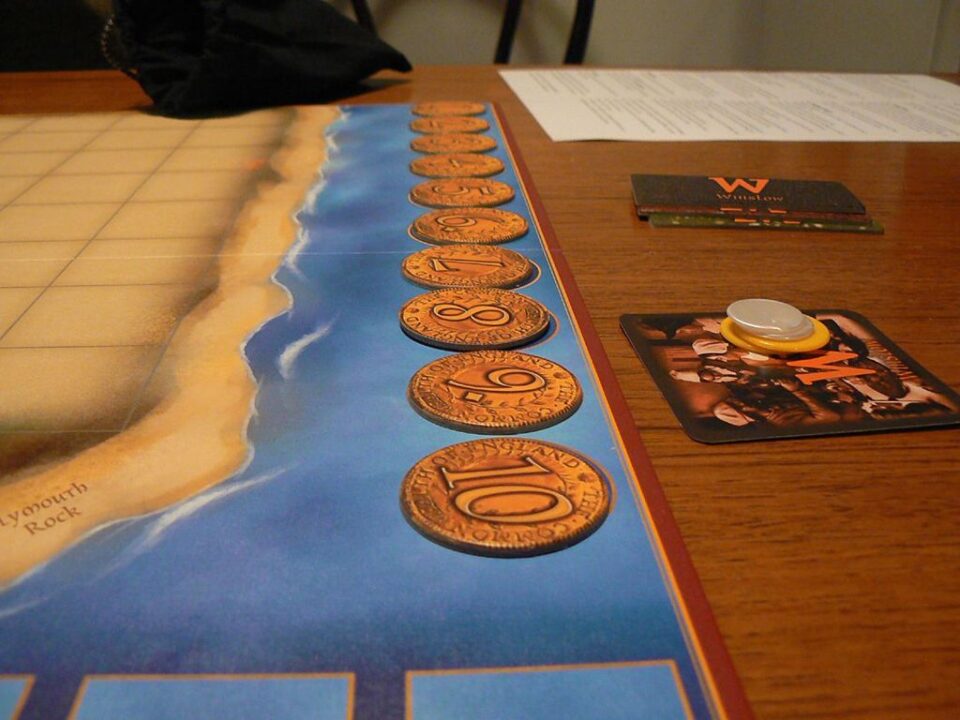
Player Interaction and Strategy in New England
New England offers a surprising amount of player interaction. It’s like a polite tug-of-war. You’re always trying to outsmart your friends while staying within your own lane. This game is all about plotting your moves while keeping an eye on your opponents. You’ll find yourself constantly debating whether to go for that perfect tile or save your resources for the next round.
Strategy-wise, New England requires you to think ahead. You need to balance between expanding your settlements and acquiring the right resources. There’s a great sense of satisfaction when your plan comes together, but watch out! Just when you think you’re on top, another player might swoop in and snatch victory from your grasp. It keeps you on your toes and makes for some thrilling game nights.
A funny moment from one of our sessions: my buddy Dave spent ages plotting his perfect move, only to have it busted by Karen’s last-minute bid. The look on his face was priceless! You learn quickly; if you snooze, you lose. But that’s part of the charm.
I do have one gripe, though. Sometimes, the competition can feel a bit too intense. If you’re playing with someone who takes games too seriously, it might cause some tense moments. So, pick your players wisely!
In summary, the player interaction and strategy elements in New England are engaging and challenging. They keep you invested and make each game feel unique.
Next, we’ll explore the component quality and design of New England. Stay tuned because it’s going to be both visually and tactilely interesting!
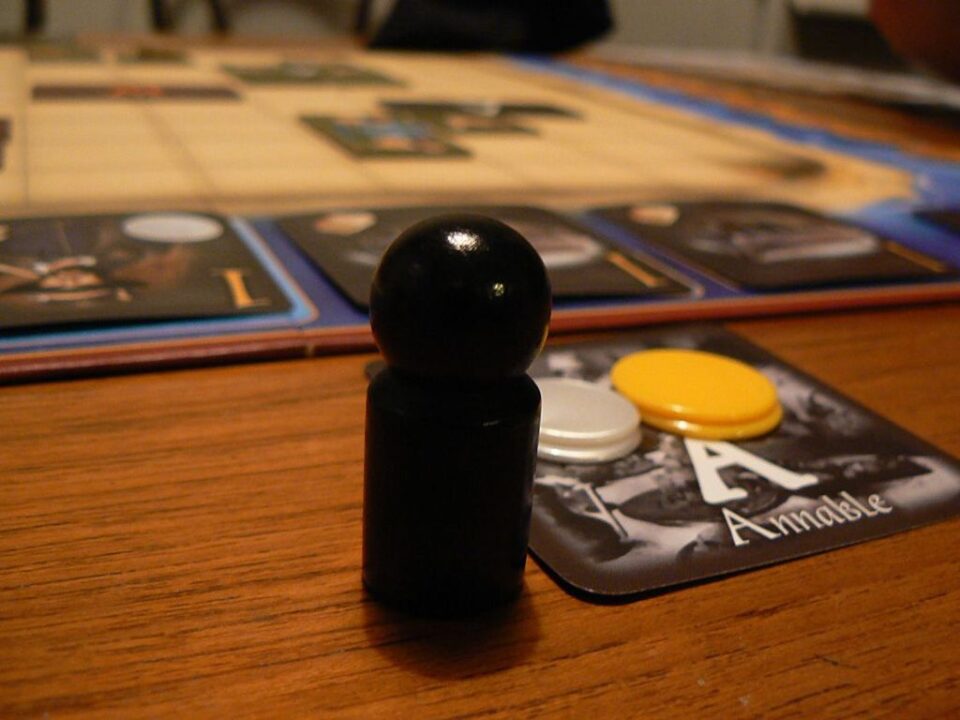
Component Quality and Design in New England
When it comes to board games, tactile sensation is part of the joy. New England nails it on the components front. The game pieces are sturdy and fit snugly into their slots, which is a relief for anyone who’s ever had a game fall apart mid-play. No flimsy cardboard here, folks!
The artwork on the board is a charming throwback. It feels like stepping into an old-timey map. It’s not overly busy, so it won’t distract you from the game, but it’s detailed enough to keep your eyes entertained during those intense moments of strategic plotting.
The cards are decent quality too. They’re easy to shuffle without feeling like they’re about to tear in half. The tiles snap nicely into place, and the money tokens have a satisfying clink to them. One minor gripe? The colors on some of the components could have been a bit more distinct. During late-night sessions, you might find yourself squinting to tell the difference between pieces.
Even the box is well-designed, with a neat insert that keeps everything organized. Ever opened a board game only to find pieces jumbled like a toddler had a go at it? Not here. You’ll find everything sitting pretty, making setup a breeze.
So if you’re a fan of games that don’t just play well but also look and feel great, New England deserves a spot on your shelf. All these aspects combine to offer a tactile experience that complements the strategic depth of the game.
Stay tuned, up next we’ll dive into the replayability and game length of New England. Or should I say, how often you’ll be dragging this beauty out on game night!
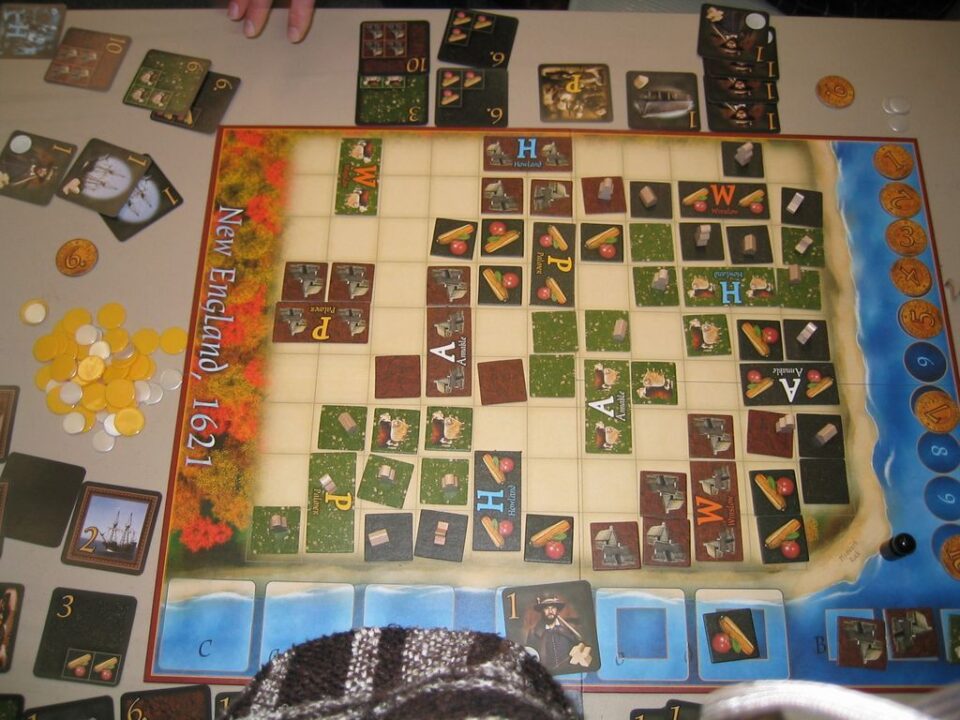
Replayability and Game Length: New England
Let’s chat about how fun it is to play New England over and over again. This game doesn’t get old fast. Each session feels like a new adventure. The game provides different ways to win, so there’s a lot to explore, even after multiple plays. You can try new strategies, mess around with different tactics, or just play the way you like.
The mix of auctioning and tile placement keeps it fresh, and the terrains change each time you play. It’s like playing a new game every time. Plus, if you have a competitive group, the game can get intense in a good way. Those tense moments when you’re close to winning? Pure gold.
Now, let’s talk about game length. You’re looking at around 90 minutes per playthrough. It’s long enough to be engaging but short enough that you can get a few rounds in a board game night. Time flies when you’re deep in strategy and making those critical moves. Just make sure you’ve got snacks handy; you’ll need them.
In sum, New England is worth keeping on your game shelf. Its replayability and manageable game length make it a winner in my book. So, do I recommend it? Absolutely. It’s a great blend of strategy, fun, and replay value.
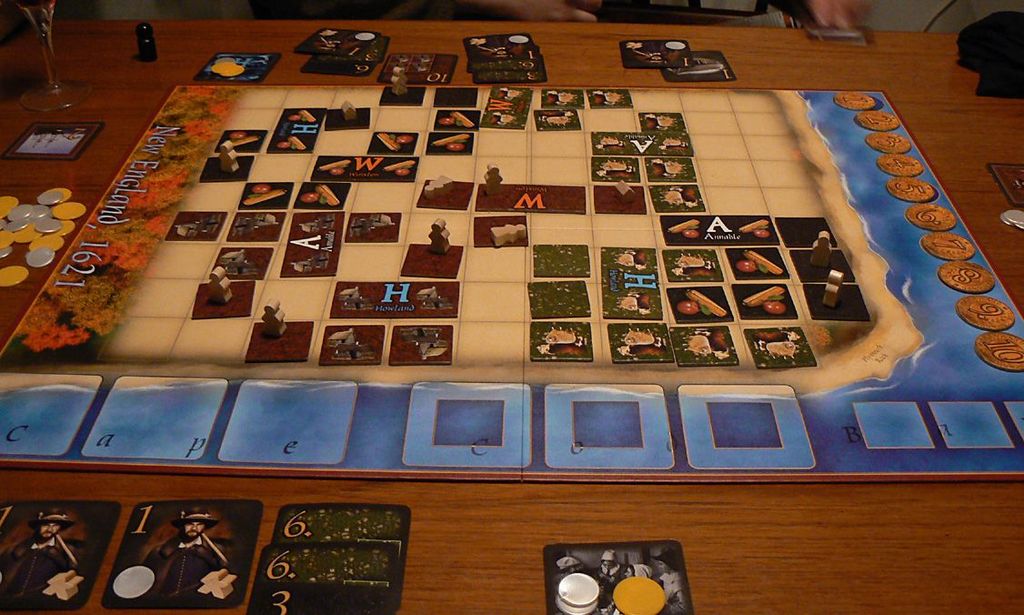
Conclusion
Alright folks, that’s a wrap for our review of New England. It’s a solid board game with enjoyable gameplay mechanics, mixing auctions and tile placement. The player interaction feels like a polite tug-of-war, which keeps things interesting. The components are sturdy with classic artwork, though a bit more color distinction wouldn’t hurt. The game has great replayability with a manageable 90-minute playtime that doesn’t overstay its welcome. While some luck is involved, it doesn’t overshadow the strategic elements. If you’re looking for a balanced game with various strategies and room for tactical decisions, New England should find a spot on your gaming shelf.

